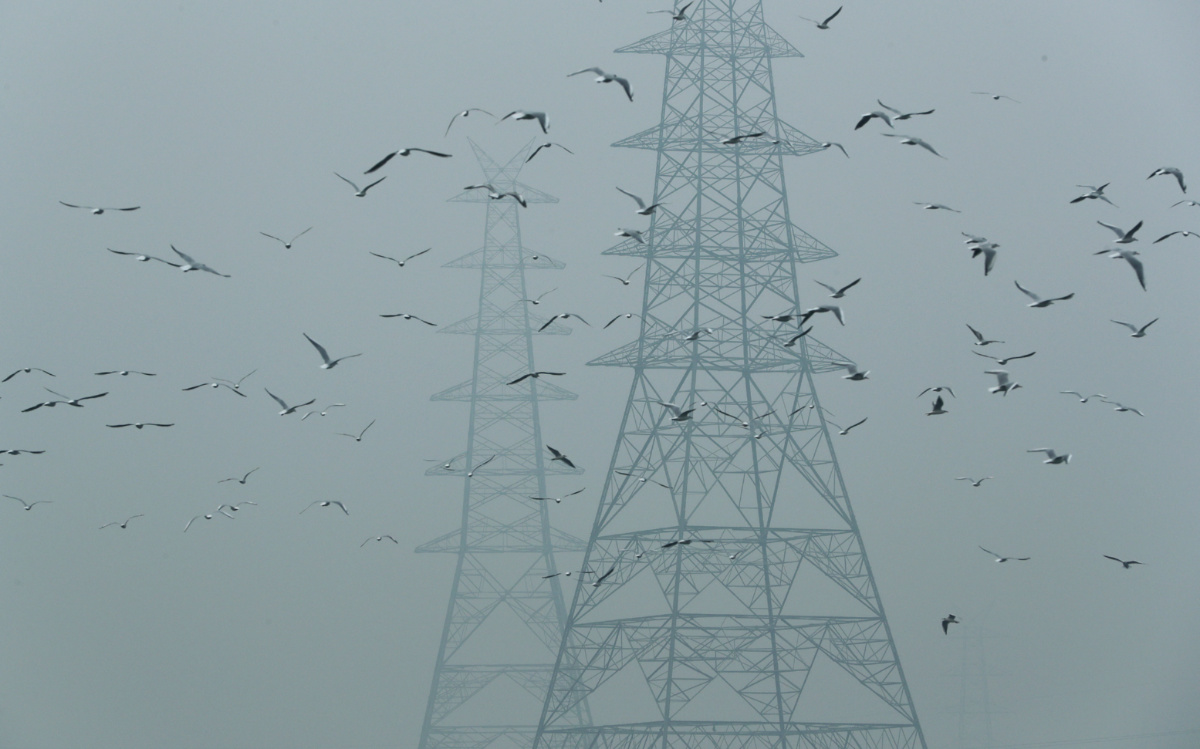New Delhi, India
Reuters
India on Wednesday rejected calls to announce a net zero carbon emissions target and said it was more important for the world to lay out a pathway to reduce such emissions and avert a dangerous rise in global temperatures.
India, the world’s third-biggest emitter of greenhouse gases after China and the United States, is under pressure to announce plans to become carbon neutral by mid-century or thereabouts at next week’s climate conference in Glasgow.

Birds fly next to electricity pylons on a smoggy afternoon in the old quarters of Delhi, India, on 30th October, 2019. PICTUR: Reuters/Adnan Abidi/File photo.
But environment secretary RP Gupta told reporters that announcing net zero was not the solution to the climate crisis.
“It is how much carbon you are going to put in the atmosphere before reaching net zero that is more important.”
The United States, Britain and the European Union have set a target date of 2050 to reach net zero, by which point they will only emit an amount of greenhouse gases that can be absorbed by forests, crops, soils and still-embryonic “carbon capture technology.
China and Saudi Arabia have both set targets of 2060, but these are largely meaningless without tangible action now, critics say.
Between now and the middle of the century the United States will release 92 gigatons of carbon into the atmosphere and the EU 62 gigatons, Gupta said, citing Indian government calculations. China would have added a staggering 450 gigatons by its net zero target date, he added.
Representatives of nearly 200 countries will meet in Glasgow, Scotland, from 31st October to 12th November for climate talks to strengthen action to tackle global warming under the 2015 Paris Agreement.
Indian Prime Minister Narendra Modi will attend the conference in a sign of how the country is taking climate change seriously, officials say. Chinese President Xi Jinping is not expected.
While working towards net zero, countries are expected to announce new and strengthened intermediate targets for cutting emissions.
Environment Minister Bhupendra Yadav said India was on track to achieve targets set at the 2015 Paris conference and left the door open to revising them. “All options are on the table,” he said.
India has committed to cutting the emissions intensity of its GDP by 33 to 35 per cent by 2030 from 2005 levels, achieving a 24 per cent reduction by 2016.
Some environment experts say India could consider lowering its emissions intensity by as much as 40 per cent dependent on finance and whether it has access to newer technologies.
Yadav said he would measure the success of the Glasgow conference by how much it delivered on climate finance to help the developing world cut their emissions while ensuring economic growth.
Earlier this week, Australia, long under fire as one of world’s top producers of coal and gas, said it will target net zero carbon emissions by 2050, but added it will not legislate the goal and instead rely on consumers and companies to drive emission reductions.
The adoption of the target will ease international criticism after Australia earlier refused to join countries in pledging to meet the target ahead of COP26.
Prime Minister Scott Morrison said Australia, one of the world’s largest emitters of greenhouse gases on a per capita basis, will achieve the target largely through technology development, with the government investing $A20 billion.
The investment will reduce the costs of technologies such as clean hydrogen and increase their use, he said.
On Tuesday, Morrison, sought to downplay any threat to domestic industries and jobs as a result of reducing emissions.
“Australians want action on climate change. They’re taking action on climate change, but they also want to protect their jobs and their livelihoods. They also want to keep the costs of living down,” he told reporters in Canberra.
“I also want to protect the Australian way of life, especially in rural and regional areas. The Australian way of life is unique.”
Morrison also said Australia will not strengthen its 2030 target of reducing emissions by 26 to 28 per cent from 2005 levels but added the country looks like it will reduce emissions by 30 to 35 per cent.
Critics said Morrison’s plan was too weak and does not prepare the Australian economy for a rapidly evolving world.
“Unless the government sets the wheels in motion to cut our emissions in half by 2030, it is making climate change worse and turning its back on the opportunities,” said Kelly O’Shanassy, chief executive officer of the Australian Conservation Foundation.
“Australia cannot keep relying on coal and gas exports because these industries are on the way out and if those workers are not helped with the transition, they will be left high and dry.”
Morrison struggled to gain backing for the net zero target from his coalition government’s junior partner, the National Party, which has a regional power base reliant on agriculture and mining.
However, the party said on Sunday it would support a net zero target. According to the Australian Financial Review, the deal includes an agreement for increased spending on regional infrastructure and tax benefits for income derived from carbon farming.
– Additional reporting by RENJU JOSE.





